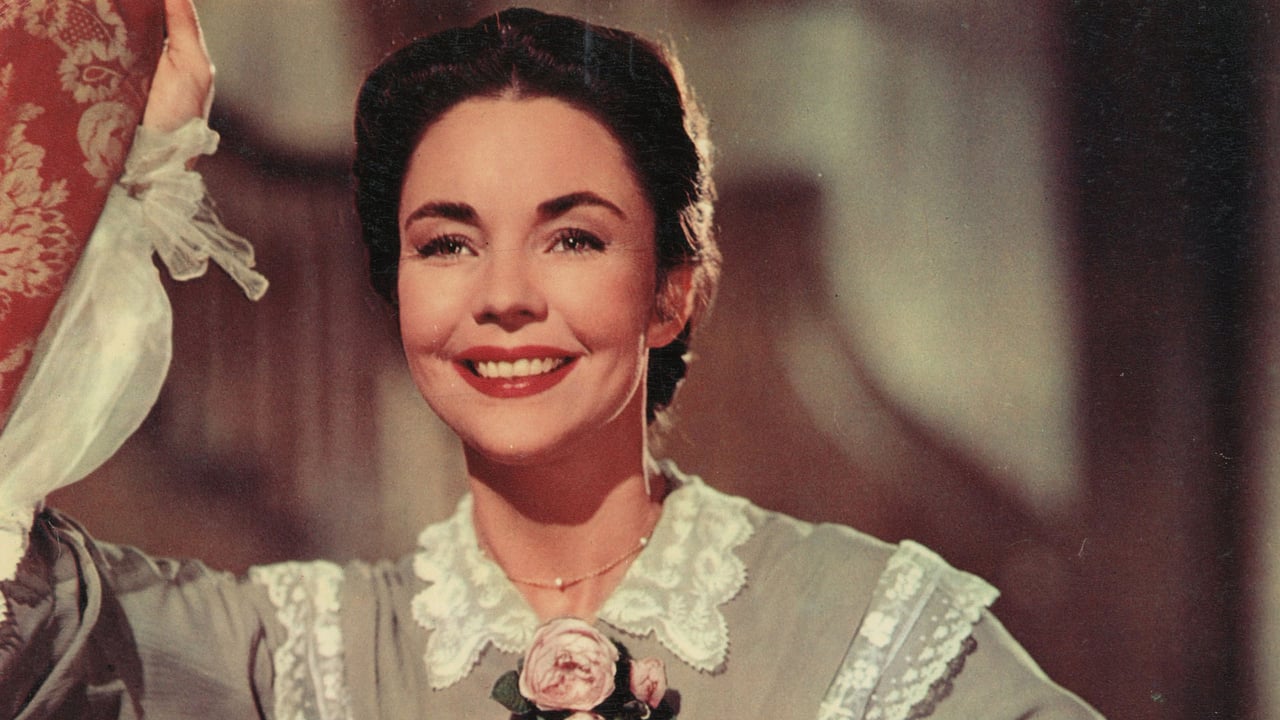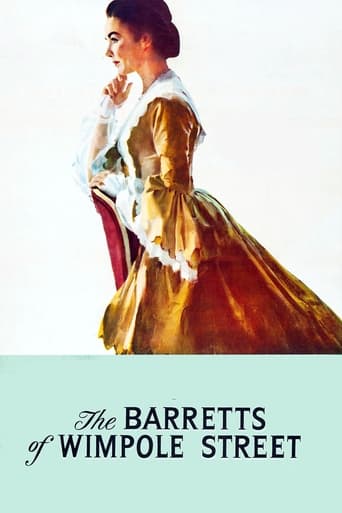



Waste of time
just watch it!
Highly Overrated But Still Good
Great story, amazing characters, superb action, enthralling cinematography. Yes, this is something I am glad I spent money on.
View MoreThis story of the courtship of two poets, the invalid Elizabeth Barrett, and the vital Robert Browning, makes for a very enjoyable couple of hours. It's nice to see a film based on a well-written play, with fine characterizations and good direction. The film is surprisingly suspenseful; apparently mundane, everyday matters absorb us slowly inexorably, until we realize they are matters of life and death. As Elizabeth Barrett, Jennifer Jones gives one of her finest portrayals. Unfortunately, it's not one she's especially remembered for, because the movie doesn't seem to be shown all that much. As Elizabeth Barrett, she's required to be the emotional center of the film, and she accomplishes that, with great warmth and simplicity. You'll find yourself rooting for her. Though she's the one American in an all-British cast, she never comes across a Barrett from Hollywood Boulevard.The great John Gielgud is a bit more problematic in the role of Moulton Barrett, the tyrannical father the large Barrett brood lives in fear of upsetting. At this point, Gielgud, though he had appeared in films, had not especially mastered (or so it would appear) the subtle technique of performing for the camera. He's not bad, but he's stagy. And I also wonder if he's the best choice for the role. But at least he's strong, and makes his presence felt. This works for the film far more than it detracts.The film also features the married team (though I'm not sure if they were, at the time) of Bill Travers and Virginia McKenna, later the stars of Born Free. Travers plays Robert Browning; he may not be everyone's idea of Browning, but he's a good actor and he has a lot of energy. McKenna plays the role of the younger sister that was played in the 1934 version by Maureen O'Sullivan. The two performances could not be more different; O'Sullivan playing the frightened little ingenue (quite well, it must be said), and McKenna playing it much more internally and with a stillness and a subtle fear. It's a very fine performance.The supporting cast is uniformly good. Sidney Franklin (who hadn't directed a film in 20 years) does a beautiful job. The sets and costumes, in color and CinemaScope, are perfect.I really enjoyed it.
View MoreCopyright 1957. A Metro-Goldwyn-Mayer picture. New York opening at the Radio City Music Hall: 17 January 1957 (ran two weeks). U.S. release: 1 February 1957. U.K. release: 1 April 1957. Australian release: 27 May 1957. 9,453 feet; 105 minutes. SYNOPSIS: Tyrannical Victorian father keeps his grown-up daughter a virtual prisoner in his Wimpole Street (London) home.NOTES: The stage play opened on Broadway at the Empire on 9 February 1931 and ran 372 performances. Katharine Cornell and Brian Aherne starred. The 1934 film starred Norma Shearer, Charles Laughton and Fredric March, and, like this version, was directed by Sidney Franklin. COMMENT: Originally designed as a vehicle for Grace Kelly, this lifeless re-make, filmed entirely in England, was the first movie Franklin had directed since "The Good Earth" (1937). He produced twelve features in the intervening years. This version of Barretts was also the second last film with which Franklin was associated in any capacity. It is a sad farewell to an often distinguished career, dating way back to 1914.Fortunately the movie is redeemed in part by Sir John Gielgud who makes his Barrett such a monster incarnate, he acts everyone else – except Susan Stephen (in the small but important part of Bella Hedley – right off the screen. No wonder Jennifer Jones makes such a pallid Elizabeth. But at least she is watchable. Bill Travers, on the other hand is an absolute disaster. Although he tries hard to make his dull, slow voice move impetuously, his "exuberance" takes the form of repeating everything twice. True, he does seem to have more than his fair share of stilted dialogue, but repeating it does not make it sing, it only makes it worse. Franklin's 1934 version had a force and intensity, this monotonously routine, watered-down, slow, overly mannered, and – aside from Gielgud and Stephen – totally insipid version signally lacks.
View MoreThroughout this film, I kept thinking of Director Wm. Wyler's adaptation of Henry James's novel, with Olivia de Havilland in "The Heiress." What made that a better movie? was it the casting? the directing? the actor chemistry? or all of the above? Previous reviewers of "Barretts" all praised Gielgud's acting, but I wondered why he accepted the role, or could stand himself in it. I could barely view him on screen, so wooden, so inhuman was his incarnation of Moulton Barrett: this was not a person, it was a caricature. Compare, instead, Ralph Richardson's interpretation of a similar emotion-starved and pathologically driven father in his love for his daughter.As for the casting of Bill Travers as Robert Browning, I felt he lacked any subtlety, any "poetry" in his manner, any semblance of an understanding of female psychology or charm, most of all, lacked any chemistry with Jones as Elizabeth. He seemed to be barking all of his lines as if he were on the football field. Can you imagine his role cast instead with, say David Farrar, or one of the Ealing Studio regulars? Fans of Jennifer Jones may still want to sit through this movie to see her conception of the poetess. But when we compare this role with her performance in, say, "Wild at Heart [Driven to Earth]," the great Powell-Pressburger film, or even "Madame Bovary," it falls far short of full realization. In those films, she revealed passion, coyness, charm and geniune fear, gripping us with the emotions of her predicament. As noted by another reviewer, here she appears far too healthy, even too mature (although that would be an accurate estimation of her actual age when she met Browning, according to her biography) to be believable. Of course we can accept some cinematic license -- we don't have to expect that Mimi should actually be consumptive in "La Boheme"--but Jones's conception confused strength of character with bodily health -- her fainting on the stairs was almost a joke, more a sign of her rare weakness as an actress. In fact, one actually felt more pity for her sister, as portrayed by Virginia McKenna, in a lively,deeply felt role, in which we feared for Henrietta's emotional health and future in that stifling household.So, shall we lay the blame at the foot of the hapless director Sidney Franklin? All the settings, the costumes, even the lovely tune, beautifully sung by Jones at the piano should have offered the right support. The clumsiness of the production is almost encapsulated in that little scene around the piano: when Jennifer sings it (whether or not she herself indeed voiced it), there is lyricism and musicality, and one longs for her to continue, but everyone, namely her brothers, is urged to join in. None of them can really sing, they shout out the melody, drowning Elizabeth's soprano, and the whole scene, at least for this viewer, is ruined. Just like the movie.Of a possible four ****, I give it my lowest rating one star*.
View MoreBeing owned by two English cocker spaniels my comments are a bit biased.This film is intriguing, not just for the overall story but the way Flush, Elizabeth's cocker, was so much integral part of it. Given the 120 line poem that she wrote about Flush it was pleasing to see that Flush was very much a part of the movie.Sir John Gielgud was a superb actor cast in the role of Elizabeth's tyrannical father. Jennifer Jones performance above par. And of course there was Flush. One very lucky cocker spaniel.
View More